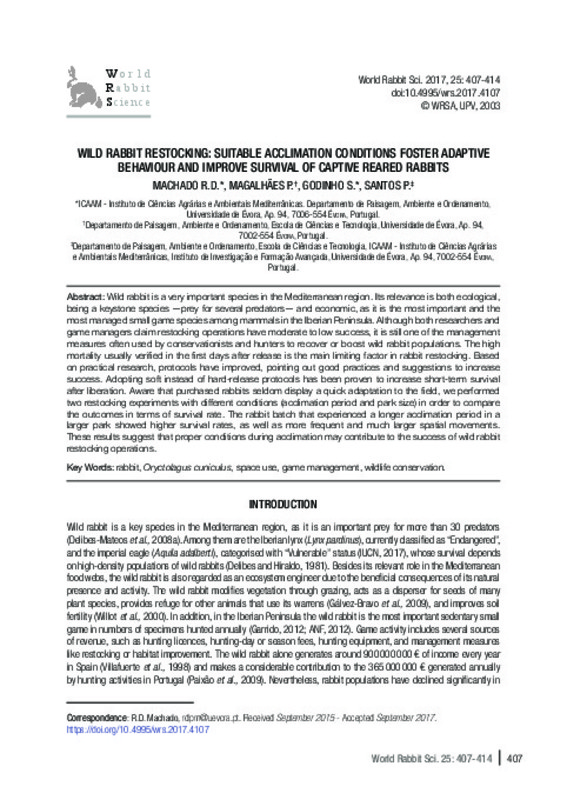JavaScript is disabled for your browser. Some features of this site may not work without it.
Buscar en RiuNet
Listar
Mi cuenta
Estadísticas
Ayuda RiuNet
Admin. UPV
Wild rabbit restocking: Suitable acclimation conditions foster adaptive behaviour and improve survival of captive reared rabbits
Mostrar el registro sencillo del ítem
Ficheros en el ítem
| dc.contributor.author | Machado, R. D.
|
es_ES |
| dc.contributor.author | Magalhães, P.
|
es_ES |
| dc.contributor.author | Godinho, S.
|
es_ES |
| dc.contributor.author | Santos, P.
|
es_ES |
| dc.date.accessioned | 2018-01-04T14:03:21Z | |
| dc.date.available | 2018-01-04T14:03:21Z | |
| dc.date.issued | 2017-12-28 | |
| dc.identifier.issn | 1257-5011 | |
| dc.identifier.uri | http://hdl.handle.net/10251/93942 | |
| dc.description.abstract | [EN] Wild rabbit is a very important species in the Mediterranean region. Its relevance is both ecological, being a keystone species —prey for several predators— and economic, as it is the most important and the most managed small game species among mammals in the Iberian Peninsula. Although both researchers and game managers claim restocking operations have moderate to low success, it is still one of the management measures often used by conservationists and hunters to recover or boost wild rabbit populations. The high mortality usually verified in the first days after release is the main limiting factor in rabbit restocking. Based on practical research, protocols have improved, pointing out good practices and suggestions to increase success. Adopting soft instead of hard-release protocols has been proven to increase short-term survival after liberation. Aware that purchased rabbits seldom display a quick adaptation to the field, we performed two restocking experiments with different conditions (acclimation period and park size) in order to compare the outcomes in terms of survival rate. The rabbit batch that experienced a longer acclimation period in a larger park showed higher survival rates, as well as more frequent and much larger spatial movements. These results suggest that proper conditions during acclimation may contribute to the success of wild rabbit restocking operations. | es_ES |
| dc.description.sponsorship | We would like to thank the Associação de Caçadores de Querença for their valuable support with the fieldwork. | es_ES |
| dc.language | Inglés | es_ES |
| dc.publisher | Universitat Politècnica de València | |
| dc.relation.ispartof | World Rabbit Science | |
| dc.rights | Reserva de todos los derechos | es_ES |
| dc.subject | Rabbit | es_ES |
| dc.subject | Oryctolagus cuniculus | es_ES |
| dc.subject | Space use | es_ES |
| dc.subject | Game management | es_ES |
| dc.subject | Wildlife conservation | es_ES |
| dc.title | Wild rabbit restocking: Suitable acclimation conditions foster adaptive behaviour and improve survival of captive reared rabbits | es_ES |
| dc.type | Artículo | es_ES |
| dc.date.updated | 2018-01-04T11:46:43Z | |
| dc.identifier.doi | 10.4995/wrs.2017.4107 | |
| dc.rights.accessRights | Abierto | es_ES |
| dc.description.bibliographicCitation | Machado, RD.; Magalhães, P.; Godinho, S.; Santos, P. (2017). Wild rabbit restocking: Suitable acclimation conditions foster adaptive behaviour and improve survival of captive reared rabbits. World Rabbit Science. 25(4):407-414. https://doi.org/10.4995/wrs.2017.4107 | es_ES |
| dc.description.accrualMethod | SWORD | es_ES |
| dc.relation.publisherversion | https://doi.org/10.4995/wrs.2017.4107 | es_ES |
| dc.description.upvformatpinicio | 407 | es_ES |
| dc.description.upvformatpfin | 414 | es_ES |
| dc.type.version | info:eu-repo/semantics/publishedVersion | es_ES |
| dc.description.volume | 25 | |
| dc.description.issue | 4 | |
| dc.identifier.eissn | 1989-8886 |








